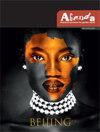All the things you could be by now if Pinky Pinky wasn’t your Madam: Black gender, Human subjectivity and the terror of solidarity
IF 0.4
Q4 Arts and Humanities
引用次数: 0
Abstract
abstract The South African legend of Pinky Pinky presents a striking opportunity to think with Hortense J. Spillers’ theorising of incubus in Harriet Jacobs’ Life of a Slave Girl (Brent 1973). These demons of urban legend enable my theoretical intervention on the question of Black gender which breaks with Human gender subjectivity, and which implies that there can be no solidarity between Human women and Black wxmxn. I utilise Spillers’ historical materialist, theoretical and psychoanalytic inspired formulation of Black Flesh to think the structuring relation of the Black wxmxn in modern South Africa’s political ontology in order to consider our emancipation dreams within the confines of the modern Enlightenment's Human and their ontological struggle for difference against a quintessential Other, the Black. This critical intervention concerning feminist solidarity and hindrances to Black intramural unity strives to reframe and constitute afresh the organising sentiment and politics of any ideological outlook which considers itself. That is that Black Feminism has been structurally excommunicated from the community of the Human and its gender-forming terms, which demarcate the domestic spaces wherein gendering processes are possible. I conclude that shared experiences of violence between Humans and Black wxmxn do not preclude the Madam from her Master function as phallic potentiality for the violent sexual gatekeeping required to secure the Human, nor should this be conflated with the ontological violence necessary to produce the Black for the Human. Blackness’ constitutive social death structures the Black wxmxn/slave as always and already coerced under the Human’s political prerogative, under a parasitic relation with no worldly emancipation path.如果平基·平基不是你的夫人,你现在可以成为的所有人:黑人性别、人类主体性和团结的恐惧
南非传奇人物平基·平基提供了一个绝佳的机会来思考霍滕斯·J·斯皮勒斯在哈里特·雅各布斯的《奴隶女孩的生活》(布伦特,1973年)中提出的incubus理论。这些城市传说中的恶魔使我能够对黑人性别问题进行理论干预,这打破了人类性别的主观性,意味着人类女性和黑人女性之间不可能团结一致。我利用斯皮勒斯对《黑肉》的历史唯物主义、理论和精神分析启发的表述来思考现代南非政治本体论中黑人wxmxn的结构关系,以便在现代启蒙运动的《人》的范围内思考我们的解放梦想,以及他们与一个典型的他者为差异而进行的本体论斗争,黑色。这种关于女权主义团结和阻碍黑人校内团结的批判性干预,努力重塑和重新构成任何意识形态观的组织情感和政治。也就是说,黑人女权主义在结构上被逐出了人类社区及其性别形成术语,这些术语界定了性别化过程可能发生的家庭空间。我的结论是,人类和黑人wxmxn之间的共同暴力经历并不排除夫人作为保护人类所需的暴力性守门人的阳具潜力的主人功能,也不应将其与为人类创造黑人所需的本体论暴力混为一谈。黑人构成性的社会死亡一如既往地构成了黑人的wxmxn/奴隶,并且已经被人类的政治特权所胁迫,处于一种没有世俗解放道路的寄生关系之下。
本文章由计算机程序翻译,如有差异,请以英文原文为准。
求助全文
约1分钟内获得全文
求助全文

 求助内容:
求助内容: 应助结果提醒方式:
应助结果提醒方式:


